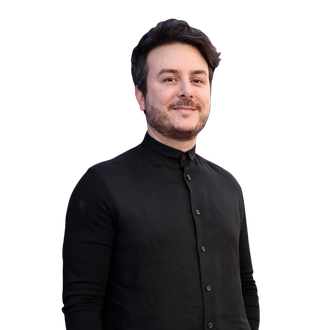
Dan Nigro knows what it’s like to be on the other side of the production process. Having started his own career as the frontman for indie rockers As Tall as Lions, Nigro had to get used to being comfortable in a studio with someone who wasn’t part of the band. That insight proved invaluable when he eventually made the jump to songwriter and producer, working with everyone from Sky Ferreira to Carly Rae Jepsen to Caroline Polachek.
But Nigro’s biggest and most recent successes have come by way of his collaborations with brand-new artists — the latest of which is Conan Gray’s newly released sophomore album, Superache. The pair have consistently worked together since Gray’s 2018 debut EP Sunset Season. In that time Nigro has become a force in the Gen-Z music landscape, having co-written and produced Olivia Rodrigo’s breakaway debut, Sour. It’s a pattern that demonstrates the 40-year-old artist’s keen ability to foster emerging voices in a way that brings out the best they have to offer without ever stifling what they have to say. There’s no better representation of the landscape Nigro thrives in than Gray’s music. The 23-year-old not only explores timely themes in songs like “Affluenza,” but his career trajectory feels extremely representative of his generation, having gained a following as a teen on YouTube, and seeing his songs become viral hits on TikTok.
For Superache’s release, we spoke with Nigro about what he looks for in new artists, the success of his cross-generational collaborations, and how he sifted through hundreds of Gray’s songs to narrow down on the final track list.
You’ve had this pattern of success working with young artists like Conan Gray and Olivia Rodrigo, both of whom feel so distinctly Gen Z and whose music culturally really speaks to that generation. What do you make of that success?
I think it’s just about being honest and talking about what’s going on in their lives. I think in their generation, something that they gravitate towards is the specificity of lyrics and honesty, which is always interesting as a — what am I at 40? I think I’m a millennial, whereas our generation was much more about metaphor and vagueness in lyrics, something that’s left for interpretation, you know? It seems this generation is much more into something that’s right on the nose.
It seems like you’re able to bring out that specificity and guide these new artists without ever overpowering their distinct voice. Is that a conscious line you walk as a producer?
I think that the biggest job of the producer, especially when it comes to the music aspect of it, is to not step on anybody’s toes. My favorite part about producing music for people specifically like Conan would be that it’s so about the lyrics [for them], and for me it’s finding where the sonic landscape can sit, where it feels super interesting and moves the song along at a great pace, but also doesn’t get in the way — which can sometimes be a really big challenge. I’m never trying to overproduce something and make a song about the production. To me, it’s always about the song itself.
You began working with Conan at the very beginning of his career when he was signed to Republic. What’s it like collaborating with a musician who’s deciding for the first time who they’re going to be as an artist versus more established artists you’ve worked with who are already settled in their lane?
I think that’s the fun part of it, sitting with someone like Conan and exploring different worlds, so to speak. It’s really great when you can go, okay, this is what the song sounds like on a Juno [synthesizer], and this is what the song sounds like on the piano, and this is what it sounds like as an electric-guitar vibe. And I’m feeding off of them. It’s seeing what they react to, if their face lights up when you do something or if they give you the negative, Ooh, I don’t like that. Working with them and seeing those reactions is one of my favorite parts about making music. It’s like when the puzzle pieces come together and you start to see what the potential of the song could really be.
Do you think your experience with As Tall As Lions better equips you as a producer working with new talent since you’ve been where they are?
Yeah, it’s a hundred percent the case. My skill set comes from years and years of working in the studio deeply with other people. I talk about myself as being a very sensitive person and I knew what it was like to be an artist working in the studio with producers and not feel comfortable at times. So I always try to put myself in an artist’s shoes when something feels like it could be awkward or it might feel sensitive. Or I felt like there were always times that producers did things that made me feel more shut off. So I always try to like, not do those things.
Conan’s work, especially on this new album, is deeply personal. What’s it like to step into that space as a third party? What perspective do you think you bring to the world of these songs as an outsider?
When it comes to someone like Conan, a lot of times I’m being a glorified editor. It’s sitting with somebody and listening to the ideas and just trying to add where I can to make it better. It’s about being a listener really, and just hearing what he’s doing and what he’s trying to say and trying to figure out if there’s ways that I think I can genuinely help enhance it to make it, you know, more exciting or more emotional or more captivating.
He’s also insanely prolific as a songwriter. He said he wrote 250 songs for this album.
[Laughs.] He writes a lot of songs.
How do you go about whittling that down to 12? And does your computer have any storage space left on it after working on a Conan Gray album?
Luckily most of the songs are actually just voice notes, so it’s not actually taking up a lot of space in that sense. But it’s a really interesting process. A lot of it is trying to listen through to all these ideas and try to see where the passed-over gems are. Sometimes you have to listen to the demos several times — which is a really long process if you’ve got like a hundred voice notes — to sift through them and give each one its own chance.
How would you compare Superache to his debut, Kid Krow?
I think the second record to me is an extension of Kid Krow in the sense that it’s very much Conan, but it’s just a little bit bolder. There’s more sonic palettes and lyrical subject matter explored. It feels like it’s just a bigger version of it. I think we didn’t wanna stray completely away from what worked about Kid Krow, we were just trying to build upon it.
You’ve said that after working with Conan, the floodgates opened up in terms of young artists reaching out to work with you, and Olivia was someone you handpicked after seeing her on Instagram. Especially now that you can be so selective, what do you look for in the talent you choose to collaborate with?
At this point I get sent so many new artists it’s actually really hard to even have the time to listen to all of them, but it’s one of two things. It’s either their voice just blows me away in a way that it’s undeniable. Or their lyrical perspective is something that I just feel is super unique.
Speaking of that unique perspective — with both Conan and Olivia, there’s this generational juxtaposition that you touched on earlier, but despite that you’re clearly a great match. Do you think it’s because there’s a universality to what they’re singing about? Or just that you bring complementary skill sets to the table?
I think it’s both. I think it’s definitely the universality of the music and then also a lot of times it’s about that yin and yang, as cliché as that sounds. There’s actually been tons of times people will send me an artist that is incredible. And they’re like, “We really want you to work with this artist,” and I’ll listen to it. And I really try to objectively just say, “Well, I think the parts that this artist is missing or the parts that this artist needs help with are not parts that I’m really good at. So I know that you think that I’m quote-unquote ‘good at my job’ or whatever, but I wouldn’t be good at this particular job.”
The artists that I work with have a story and I just help with all the other spots of it. So for me, it’s knowing when I’m the right fit in those situations, and definitely with Conan it’s that way. He’s really, really great with lyrics and I’m able to come in and try out all these different sonic ideas.
“Drivers License” and “Heather” are two songs that were these surprise hits — “Heather,” Conan’s biggest song, wasn’t originally even meant to be a single. Did that experience change your perspective about what a hit song is?
I think it definitely emboldened me as a producer to just go with my gut, cause it’s funny, I would agree with you that prior to those songs coming out, I never thought like, oh wow, this is a hit song. But the funny thing is [when I was making Kid Krow], every time people would ask me like, “How’s the Conan record? You gotta play me something,” I’d always be like, Oh, you gotta hear “Heather,” this song is amazing. I would always play “Heather” whenever I wanted to impress somebody as a producer. So I guess in a way, I always knew that it was the best song.
What about this time around? What’s the song on this album that you’re playing for people the same way that you played them “Heather”?
“Family Line” is definitely my favorite. And “Memories” was the song that I was like, Oh, this is the one I’m really excited to play for people.
This interview has been edited and condensed for clarity.


